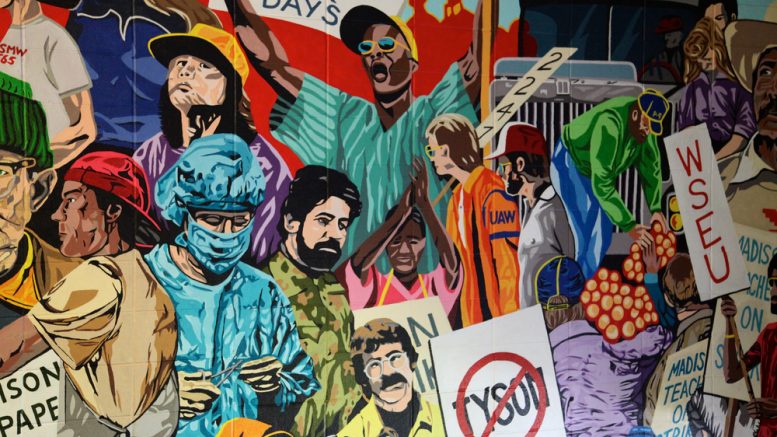
By Tom Crofton
The Commoner Call (7/3/17)
For all of the positives in joining with peers to develop solidarity there are areas where unions fail to realize their potential. The bargaining table at times has three sides, where the institution of the union creates a place separate from the workers. This reality has led to the creation of an organization to support union members in making their unions better. The Association for Union Democracy (AUD) was created to be a pro-labor, non-profit organization dedicated to advancing the principles and practices of democratic trade unionism in the North American labor movement.
AUD has been very helpful over the years supporting concerned activists in making their unions better. They provide legal help and rock solid support for workers standing up to less-than-democratic activities of leadership. Their support is usually requested after serious issues arrive for workers.
Labor Notes is a media and organizing project that takes a proactive stance to union organizing and been the voice of union activists who want to put real worker movement back in the labor movement, since 1979.
They hold conferences, organizing seminars, and publish a regular email newsletter. The following story comes from their June newsletter.
“Transit Workers Take the Driver’s Seat in ‘Right-to-Work’ Tennessee
By Chris Brooks
Labor Notes (6/23/17)This story takes place in my home state of Tennessee, where Patrick Green started driving a bus in Nashville in 2008. Back then, he says, here’s how negotiations typically went in Transit (ATU) Local 1235: A month before bargaining, officers “would send out a note to the members asking for the top three things they wanted the union to achieve. Then the executive board would never say another word about it.”
When it was time to ratify, members never saw the deal. “We would come in and vote on the agreement without knowing anything about what was in it,” Green said. The union seemed useless, and for a long time he didn’t get involved.
But that changed in the lead-up to 2015 bargaining, when friends who knew he had a management background and experience with negotiations encouraged him to get involved in the contract somehow.
Union leaders weren’t so enthusiastic. “The leadership rejected all of our attempts to help,” said Green. “Out of this frustration with getting involved, my friends said I should run [for president]. I agreed.” Two other members agreed to run with him.
VOTING FOR DEMOCRACY
One member had the idea of hosting town hall-style debates among the candidates—something the local had never done before. Held over multiple Saturdays at a Shoney’s restaurant, the debates drew an enthusiastic response. Members showed up with their families to eat breakfast and lob questions.
The incumbent president had run the local for 18 years. Green had no formal union experience—and says he’s an introvert.
But at the town halls, Green and his slate laid out a different vision for the union. In particular, they pledged transparency and member participation in negotiations.
In a field of four candidates, Green swept 65 percent. The others on his slate won as well. And the new leaders jumped right into negotiations, winning some strong gains—starting wages went up by $3 an hour—in a contract that all members got the chance to read before casting their votes.
CONVERSATIONS ARE KEY
It’s no wonder that in “right-to-work” Tennessee, Local 1235 is recruiting new members. A year ago, its membership rate was 60 percent. Now it’s 80 percent.
Organizing conversations are a key recruitment tool. Union officers and stewards meet with workers to hear about workplace problems and plan how to fix them. They reach out at every opportunity, including at new-hire orientation, during training, and when they meet to bid for jobs.
The union doesn’t limit these conversations to new hires—or even to members. “Many times it is the spouse that takes the children to the doctor, so we reached out to talk to them about our medical insurance,” Green said. “We even opened it up to non-members.” The local has also worked alongside a worker center to found a Bus Riders Union.
Since Nashville drivers are employed by a private nonprofit, not the city, they have the right to strike. Green is organizing a meeting in September to talk with members and families about financial planning—both for retirement and for a potential strike.
The meeting is part of involving everyone in a plan to win a better contract. “I will be asking our members to put away $20 per pay period into an account to build up for a strike next year,” Green said. “The bank will be on hand to help them open the account for free.”
Most of us, most of our lives, live with decisions made by others. When we take action together, we change that. Suddenly we have a feeling that another world is possible. Those are the moments that create converts—and sustain those already on board. Those are the moments that unions need to multiply.”
*****
Many of us have experienced situations where we are told to “just follow orders”. This way of acting has no place in a thinking, and caring world; and certainly not in our labor organizations. While many workforces and organizations follow a para-military model, with a pyramid of decision making power and replaceable pieces below, our labor unions need to concentrate on the base; the rank and file. Many of us have tried to get our union leadership to rotate back into the ranks, to get first hand experience of the conditions we labor under, and to remember what the 40+ hour week on the line is like. The special skills of agents and negotiators need to be spread around, and the idea of going beyond fractured unions with separate leadership pyramids maintaining their special institutional status need to evolve into industry-wide, international organizing efforts to manage the workplaces of the globalized economy.
(Art from portion of mural at Madison Labor Temple.)

